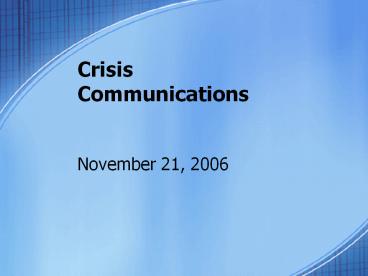Crisis Communications - PowerPoint PPT Presentation
1 / 21
Title:
Crisis Communications
Description:
The consequences for your organization's reputation or image ... virtually all crisis-management consultants (a subcategory of PR professionals agree on) ... – PowerPoint PPT presentation
Number of Views:251
Avg rating:3.0/5.0
Title: Crisis Communications
1
Crisis Communications
- November 21, 2006
2
What is a crisis (generally)?
- A decisive moment a turning point
- Typically, one that has a distinct possibility of
turning out bad!
3
Whats a PR/communication crisis?
- A situation that threatens the integrity or
reputation of your organization - Often because of media or other public
communication about a problem or unseen negative
event that affects your organization
4
What this means
- When something bad happens to/involving your
organization - e.g., legal dispute, theft, accident, injury,
death, scandal, acts of God/nature, information
leaks, rumors/lies, human error, clerical error,
bad supervision, consumer protest, critical media
coverage, lawsuit, industrial espionage,
terrorism, employee threats, etc.
5
You really have (at least) two problems
- The consequences for the actual victims
- The consequences for your organizations
reputation or image - And as a PR professional, youre involved (on
some level) with solving both
6
A good crisis plan
- Addresses both of these problems
- The actual bad event
- Which must be contained and corrected (and,
ideally, prevented from happening again) - The effects of the event on your organizations
reputation - And, thus, its relationships with its publics
7
Sudden crises vs. smoldering crises
- Whats the difference?
- From a PR professionals standpoint, why does the
difference matter?
8
Classic crises requiring crisis plans
- Tylenol poisoning
- Vandals tampered with Tylenol bottles, lacing
them with cyanide - Exxon Valdez oil spill
- Oil tanker runs aground 11 million gallons of
oil spread contaminate 600 miles of shoreline - Space shuttle explosions two of them!
- Mark Foley page scandal
- Spinach contamination (E. coli)
9
In a perfect world
- Organizations write crisis plans BEFORE any
crisis actually erupts - So theyre prepared in case something bad ever
happens - But even with a crisis plan in the files
- An unanticipated problem can always occur
- And even anticipated problems (in the abstract)
have unanticipated specific details
10
How to respond to a crisis the broad strokes
- What virtually all crisis-management consultants
(a subcategory of PR professionals agree on) - Tell it all
- Tell it fast
- Tell the truth
- Be true to your organizations values
- Be consistent in what you stand for
11
Your main goal (perhaps, as PR professional, your
only goal)
- Protect integrity/reputation of your organization
- So, never try to
- Lie
- Deny your involvement
- Hide your involvement
- Delay your communication to your publics longer
than necessary - You need to plan, but you also need to be quickly
responsive
12
When crisis erupts, what must you do (although
not necessarily in this order)?
- Respond to (solve) the immediate problem
- If you cant eliminate it, then at least reduce
it as much as possible - Take steps to ensure problem is not repeated
- Communicate honestly about the problem
- What happened
- What youre doing in response (how youre solving
it) - What youre doing now to prevent its reoccurrence
in future
13
What else you must doeither before crisis erupts
or immediately afterward
- Designate a spokesperson
- Who will talk to the media?
- Who will talk to employees, customers, and other
stakeholders? - In most cases, the CEO (president) is appropriate
- But you might also use back-up communicators
- experts who can explain technical details if
necessary - PR person
- (especially true if CEO is part of problem!)
14
What you might need to do, produce, or prepare
- Press conferences
- Speeches
- News releases
- More detailed information
- Information sheets, brochures, drawings
15
Your crisis plan must indicate
- Facts about the crisis itself
- What the problem is
- How its being solved
- Who is solving it
16
Your crisis plan must communicate your
communication issues
- Your communicator(s)
- Your key message points
- What your communicators(s) will communicate
- What happened
- What youre doing about it right now (short-term
actions) - What public(s) need to know or do right now
- How you want people to respond
- What will change in the future (long-term
actions) - How/when all of this will be communicated
- which tools/media in which order
17
What a top-notch crisis plan will also include
- Ways to turn the crisis into an opportunity
- How can you turn what is undeniably negative into
something positive? - Whats the silver lining to your cloud?
- Not spin! Whats the real silver lining?
- How can you communicate the good news in the
midst of your bad news communication?
18
Some good things that can come out of crises
- Long-present (but long-ignored) problems can be
addressed - An organization can change
- Its product
- Its people
- Its way of doing business
- Heroes can emerge
19
One specific tool you MUST use for this exercise
- A press conference
- One or more of your team members will deliver a
statement to the press - And will respond to questions from the press
- Who is the press today?
- Your classmates on the other team
- Me
20
Tips about your communication content (what
youre saying)
- Dont be vaguedo be specific
- Dont say no comment to questions from the
press
21
What happens now?
- Divide into teams
- Review your scenario
- Take 10 minutes to prepare your plan
- Hold a 5-minute press conference
- After the press conference, hand in your plan
outline - Which you may wish to revise after your press
conference!































